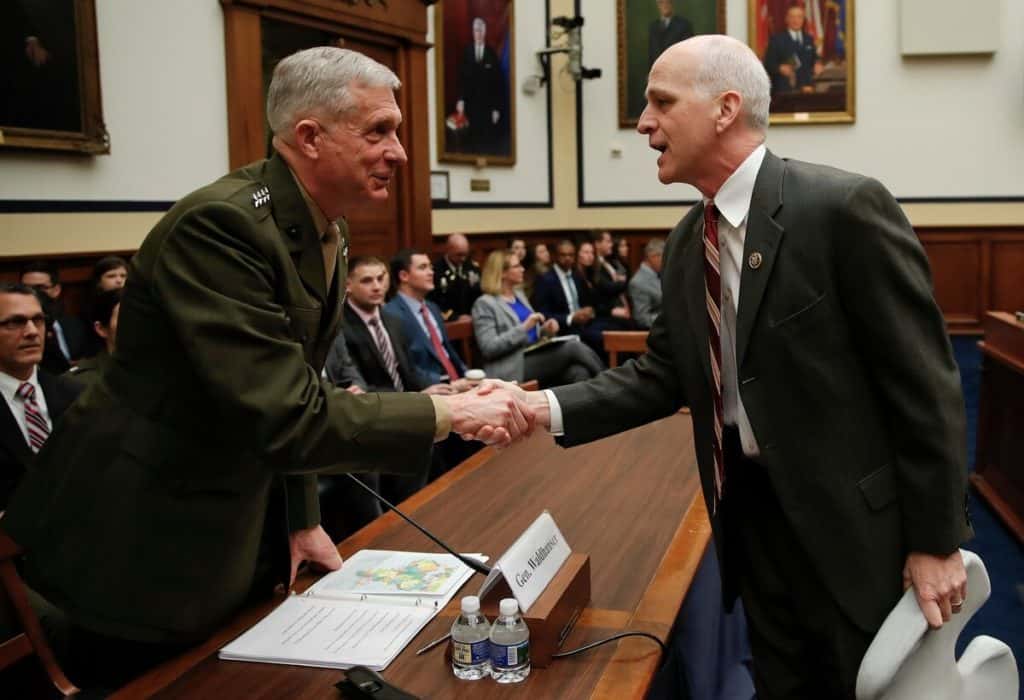Back in July, the House of Representatives included an amendment in the National Defense Authorization Act (NDAA) to force the Environmental Protection Agency to designate all per- and polyfluoroalkyl substances (PFASs) “as hazardous substances” under the Comprehensive Environmental Response, Compensation, and Liability Act, the Superfund law. PFASs are known to threaten public health.
The amendment, authored by Rep. Debbie Dingell (D-Michigan), would have forced the military — which has released these chemicals into the environment through routine fire-training exercises — to clean up PFAS-contaminated water and soil at more than 400 military bases and their surrounding communities in the U.S.
Now, however, it’s become apparent that Democratic leadership is buckling to the demands of the Pentagon to strip the measure from the NDAA.
When Senate Armed Services Committee Chairman Jim Inhofe (R-Oklahoma) introduced S. 2731 on October 30 — which he described as a “skinny” NDAA bill, omitting a provision designating PFASs as hazardous substances — Rep. Adam Smith (D-Washington), chair of the House Armed Services Committee, expressed doubts about the likelihood of a stripped-down NDAA passing the House.

But now the Democrat says, “I will not hold up the defense bill over that PFAS provision, as much as I feel like it should be addressed.…We’re not going to grab something from some other committee’s jurisdiction and jam it into our bill.”
But this isn’t the whole truth.
These momentous decisions are made at the top levels of the party. The Democrats just aren’t up to doing battle with the Defense Department. No one is.
Congress is happy to kick the PFASs can down the road. It’s predictable and sadly pathetic. So is the lack of mainstream news coverage on PFAS contamination — one of the greatest public health crises in U.S. history.
Representative Smith was an unlikely character to carry water that would have resulted in Defense Department liability in the tens of billions of dollars. The Washington lawmaker’s top contributors include Northrop Grumman, Boeing and General Dynamics — three companies that may be adversely affected if Congress mandates a PFAS cleanup.
Although Senate Minority Leader Chuck Schumer (D-New York) co-sponsored legislation earlier this year to include all PFAS substances under the Superfund law, he has been publicly silent as the Democrats have apparently folded on this amendment. Likewise, House Speaker Nancy Pelosi (D-California) and Majority Whip Rep. Steny Hoyer (D-Maryland) have nothing to add.
In this political climate, politicians who support clean water are deemed “anti-military.”
Senator Inhofe and Sen. John Barrasso (R-Wyoming), chairman of the U.S. Senate Committee on Environment and Public Works, are the point men for the Pentagon in the Senate. Barrasso argues that imposing Superfund liabilities would be unfair because government and industry have used these chemicals “in good faith.”
Barrasso, a top recipient of campaign cash from the chemical industry in the Senate, speaks for a party beholden to the same corporate interests. His logic is an abomination because the Defense Department and the chemical industry have known for 50 years that these chemicals are deadly.
Barrasso says it’s unfair to subject airports, refineries, wastewater treatment plants, landfills and other entities that use or handle fire-fighting foam containing PFASs to new regulations because they have used these substances in good faith to protect workers and the public at large, or they have been unaware of the chemicals’ risks.
However, there’s plenty in the public record to demonstrate that many of these entities knew of the calamitous health effects of PFASs — hardly what one could call “good faith.”
The point is that someone needs to pick up the tab. People are dying. It’s apparent that the federal government and the Defense Department have no intention of doing so. Moreover, if Barrasso gets his way — and it’s likely he will — no one will be required to remediate already existing contamination while these entities continue to poison people.
How did it come to this? How could elected officials become so callous and so dismissive when faced with a historic public health crisis? Sure, Barrasso is the Senate’s top recipient of cash from the chemical industry, and he comes from a tiny state with disproportionate power and a population one-tenth the size of Maryland’s, but it goes deeper than that.
Barrasso is the consummate member of a team locked in a battle with opposing forces, like the camaraderie and hype surrounding a homecoming football game against archrivals. Barrasso and his party are consumed by battle with the Democrats.
If Barrasso is the leading receiver, Inhofe is the quarterback and star player on the home team. The two have their own cheering section made up of entities like the U.S. Chamber of Commerce, the American Chemistry Council, American Fuel and Petrochemical Manufacturers, the American Petroleum Institute and the National Association of Manufacturers (among others) that are more concerned with their bottom line than human health.
Click to Subscribe to the Civilian Exposure Newsletter for Latest News & Updates Today!

